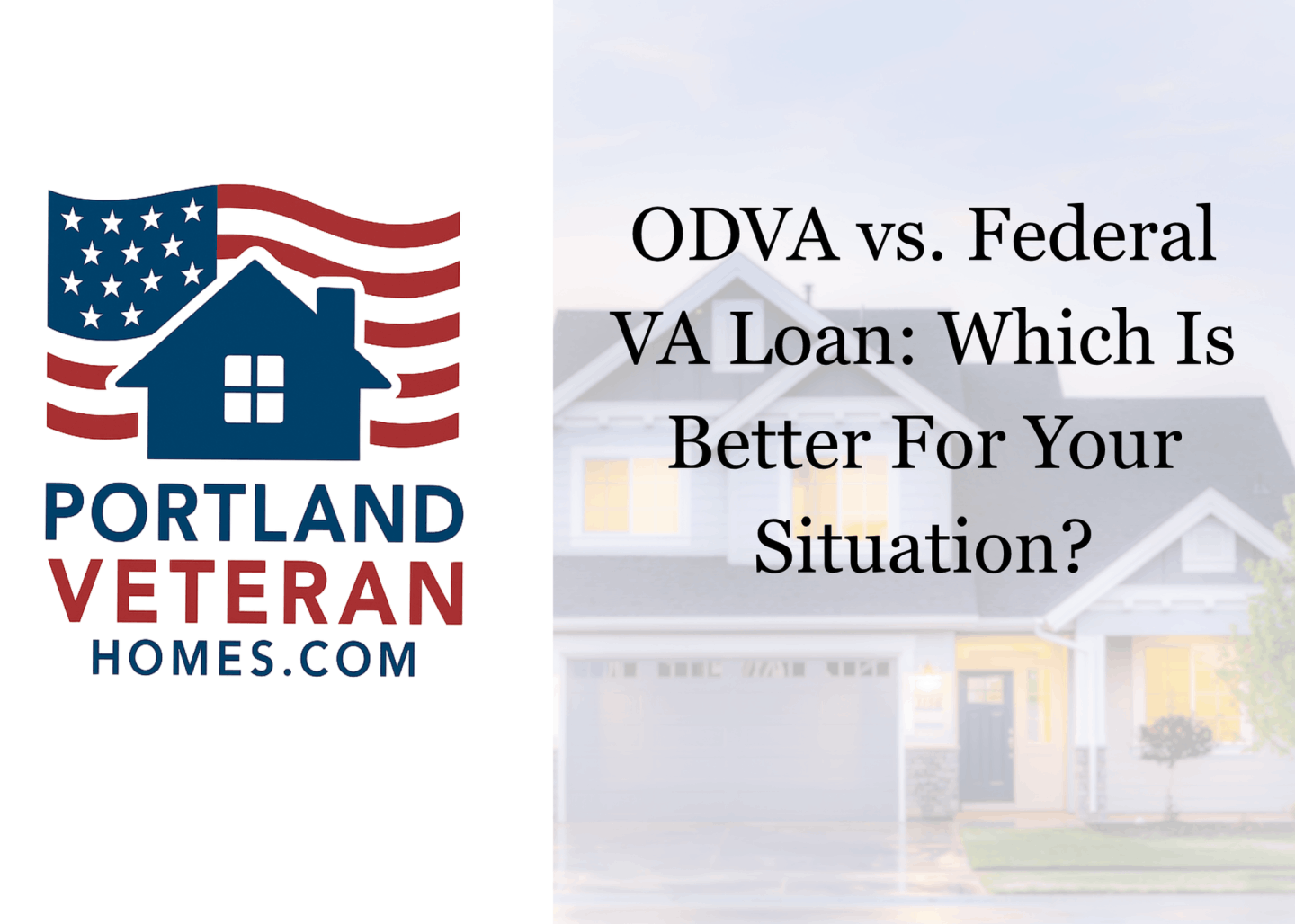ODVA vs. Federal VA Loan Which Is Better For Your Situation


Straight talk for Oregon Veterans. You’ve got two powerful options: the federal VA loan (available nationwide through private lenders) and the ODVA loan (Oregon’s own state run mortgage). Both can be great. The right choice depends on your plans, your eligibility, and how long you’ll keep the home.
Quick Answer
• Use a Federal VA Loan when you want maximum flexibility: refinance options (IRRRL), reusable benefit, broad lender choice, and competitive rates with a VA guaranty.
• Use an ODVA Loan when you’re buying in Oregon, plan to hold the home for a while, want a fixed rate with no VA funding fee, and understand it’s generally a one time lifetime benefit.
| Feature | Federal VA Loan | ODVA (Oregon) Loan |
|---|---|---|
| Who runs it | U.S. Department of Veterans Affairs | Oregon Department of Veterans’ Affairs |
| Where you can use it | All 50 states | Oregon properties only |
| Who makes the loan | Private lenders; VA guarantees a portion | State of Oregon lends directly |
| Down payment | Typically 0% | Typically 0% |
| PMI | None | None |
| Funding fee | Yes (disability exemptions apply | None |
| Rate types | Usually fixed; some lenders offer ARMs; can be very competitive | Fixed rate only (15 or 30 year) |
| Refinance options | IRRRL (streamline), cash out | Limited; generally purchase focused |
| Lifetime use | Reusable across your life (subject to eligibility/entitlement) | Typically once per Veteran |
| Property standard | VA appraisal with Minimum Property Requirements | ODVA underwriting; does not mirror VA MPRs exactly |
| Best for | Flexibility, future refis, multi state moves | Long term Oregon buyers wanting no funding fee and a simple fixed loan |
Bottom line: If you’ll want to refinance later or might move out of Oregon, the Federal VA path is usually smarter. If you’re set on Oregon and want no VA funding fee plus a solid fixed rate, ODVA can be a standout.
When ODVA Usually Wins
• You’re buying a primary residence in Oregon and plan to keep it for years and don't plan to refinance.
• You qualify for ODVA and value no funding fee.
• You want a simple fixed rate loan (15 or 30 years) with stable payments.
When Federal VA Usually Wins
• You want refinance options later (IRRRL or cash out).
• You may move out of Oregon or buy again and again using your VA benefit.
• You want multiple lender options, possibly faster underwriting and broader overlays.
Eligibility Snapshot
Federal VA: Service based eligibility for Veterans, active duty, National Guard/Reserves (with qualifying service), and certain surviving spouses. Lender will verify COE, income, credit, and residual income.
ODVA: Oregon resident Veteran purchasing an Oregon property; ODVA verifies service/eligibility and underwrites directly. Fixed rate purchase loans only (no PMI, no funding fee).
Note: Program specifics (rates, caps, and documentation) update periodically. We’ll check today’s numbers before you decide.
Total Cost Considerations (What Really Matters)
1. Up front costs: Federal VA may include a funding fee (unless exempt); ODVA does not. Closing costs exist for both and can sometimes be negotiated or covered via credits.
2. Monthly payment: Compare actual rate + term + taxes/insurance/HOA. The lowest APR wins over time—but only if you keep the loan long enough.
3. Time in home: If you plan to refinance or sell soon, flexibility (Federal VA) often beats small rate deltas.
4. Future use: Federal VA is a repeatable benefit; ODVA is typically one time.
Real World Scenarios
• Stationed elsewhere later? Choose Federal VA. You can reuse the benefit and refi easily with IRRRL.
• Staying put in Oregon? ODVA can shine—no funding fee, fixed rate, lean long term cost.
• Tight appraisal? ODVA underwriting doesn’t mirror VA MPRs; property issues that might snag a VA appraisal could be evaluated differently under ODVA.
What to do next
1. Confirm eligibility for both programs and pull your COE (for Federal VA).
2. Shop real rates (same day) for Federal VA lenders and ODVA to give you an apples to apples quote.
3. Run a break even analysis: up front fees vs. monthly savings vs. how long you’ll keep the home.
4. Underwrite the property fit: location, condition, HOA, condo/townhome rules, well/septic, rural/acreage.
Documents Checklist
• Government ID; DD 214 or service statement (and COE for Federal VA)
• 30–60 days of pay stubs; 2 years of W 2s/1099s/tax returns (as applicable)
• Award letters for tax free disability income (lenders may gross up this income for qualifying)
• 2 months of bank/asset statements; gift letter if applicable
• Purchase contract & property disclosures (when in escrow)
FAQs
Can I use both programs? Not on the same loan. But you can compare both and choose the better deal for this purchase.
Is ODVA always cheaper? Not always. It’s often competitive because there’s no funding fee and rates can be strong, but Federal VA lender credits or market moves can tilt the math. We’ll compare today’s numbers.
What about condos, manufactured homes, or rural properties? Possible in both programs with case by case underwriting. Property type/condition can swing the decision.
If I’m 100% VA disabled, is Federal VA funding fee waived? Yes—disability exemptions apply. That can make Federal VA extremely compelling.
Northwest Realty Source
Principal Broker/Owner
Veteran-Marine Corps Sgt. Fox 2/4
Text or Cell 503.997.4169
